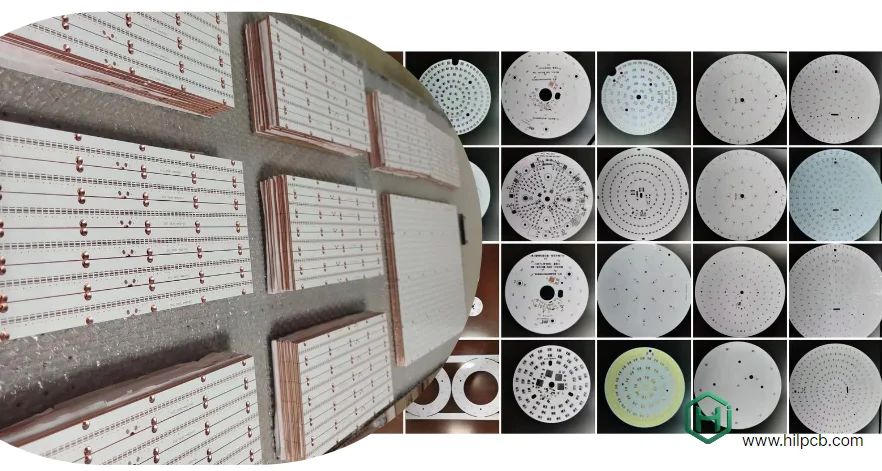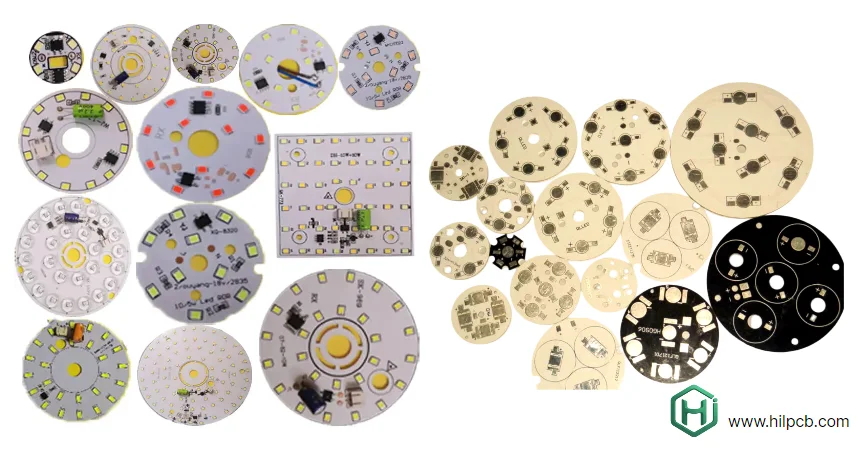Prototype manufacturing bridges the gap between design and full production. For aluminum PCB projects, it ensures thermal, electrical, and mechanical performance are verified under realistic conditions — before mass investment begins.
At HILPCB, we combine rapid aluminum PCB prototyping with production-grade processes, supporting both small-batch and volume-scale transition. Our end-to-end services — from metal-core PCB fabrication to turnkey assembly — provide reliable, production-representative results in just 5–7 days.
1. Why Professional Prototyping Matters
Production-Grade Accuracy
A high-quality prototype uses the same materials, lamination pressure, and dielectric systems as full-scale manufacturing — ensuring results translate directly to production. Even slight variations in thermal interface layers can distort heat-transfer data for high-thermal PCBs.
Fast and Consistent Turnaround
5–7 day delivery is achieved through lean workflows and prototype-dedicated lines — not shortcuts. Automation, real-time scheduling, and fast material access ensure reliability without compromising traceability.
Iteration Support
Each prototype cycle serves a distinct purpose:
- Proof-of-concept validation
- Layout and material optimization
- Pre-production confirmation
Every iteration moves your design closer to mass production readiness.
2. Prototype Fabrication Capabilities
Material Options
Thermal conductivity range:
- 1–2 W/mK: Standard cost-effective builds
- 2–4 W/mK: Balanced LED and control circuits
- 4–6 W/mK: High-power or automotive systems
- 6–8 W/mK: Extreme-performance applications
Base alloys: 5052, 6061, 1100 aluminum.
Copper & Surface Finish
- Copper weight: 1–10 oz (standard to heavy copper)
- Finishes: HASL, ENIG, OSP, or immersion silver — compatible with SMT assembly and lead-free soldering.
Precision & Scale
- Min trace/space: 100–150 µm
- Drill size: 0.3 mm typical
- Hybrid FR4-aluminum builds and HDI PCB structures for high-density designs.
3. Design Validation and Testing
Comprehensive validation ensures prototypes reflect actual performance before production investment.
Thermal Testing
- Junction-to-base resistance measurements
- Infrared imaging under operating load
- Temperature rise mapping
Electrical & Mechanical Testing
- Continuity and isolation checks
- Impedance control validation
- Hi-pot testing up to 3000V
- Mechanical flatness and adhesion inspection
Assembly Verification
- Small-batch builds (5–50 pcs) for process trials
- Reflow simulation with aluminum base thermal profiles
- Post-reflow X-ray inspection and solder analysis
Environmental Testing
- Thermal cycling (-40°C to +125°C)
- Humidity and vibration exposure
- Aging and reliability simulation

4. Small-Batch and Large-Volume Transition
After prototype validation, many customers require small-batch or pilot runs before full-scale production. HILPCB bridges these stages seamlessly with flexible capacity and consistent quality systems.
Small-Batch Production (50–1000 pcs)
- Ideal for design verification, beta testing, or limited product release
- Same materials, stack-up, and processes as volume runs
- Enables early market feedback while controlling cost
Large-Volume Manufacturing (1000+ pcs)
- Automated panelization for cost optimization
- Statistical process control for repeatability
- Supply chain integration for stable component sourcing
Both stages use unified quality systems, ensuring results scale predictably from prototype to mass manufacturing.
Parallel Scaling Advantage:
During small-batch production, our engineering team refines process parameters and tooling for upcoming high-volume runs — shortening your time-to-market by up to 40%.
5. Comprehensive PCB Prototyping Capabilities
While aluminum PCBs are core to thermal management applications, we also provide rapid prototyping for other PCB technologies, enabling mixed-technology product development.
- FR4 PCB: Standard rigid boards for control and signal circuits.
- Flex PCB: Lightweight flexible circuits for wearables or compact modules.
- Rigid-Flex PCB: Combines rigidity and flexibility in one structure.
- High-Frequency PCB: RF and microwave boards with controlled impedance.
- Ceramic PCB: Exceptional heat resistance and dielectric stability for precision sensors.
This multi-technology capability allows single-source management — particularly valuable when aluminum substrates are part of hybrid or multilayer assemblies.
6. Selecting the Right Prototype Partner
When choosing a prototype supplier, consider:
- Proven aluminum and hybrid PCB expertise
- Small-batch and volume-scale readiness
- ISO 9001 and IPC-A-600 process certification
- DFM and thermal analysis support
- Transparent communication and pricing
A capable partner ensures not only quick turnaround but also a consistent path to reliable, high-volume manufacturing.
Conclusion
Aluminum PCB prototype manufacturing lays the foundation for fast, reliable product development. By integrating rapid prototyping, small-batch flexibility, and multi-type PCB capability, you can validate your designs faster and scale with confidence.
HILPCB combines short lead times, precision fabrication, and cross-technology expertise — from aluminum and FR4 to flex and ceramic boards. Whether you need a single prototype, a 500-piece pilot run, or full-scale production, we provide seamless, high-quality manufacturing that accelerates your innovation cycle.

